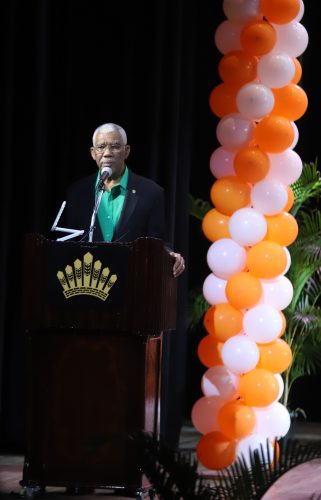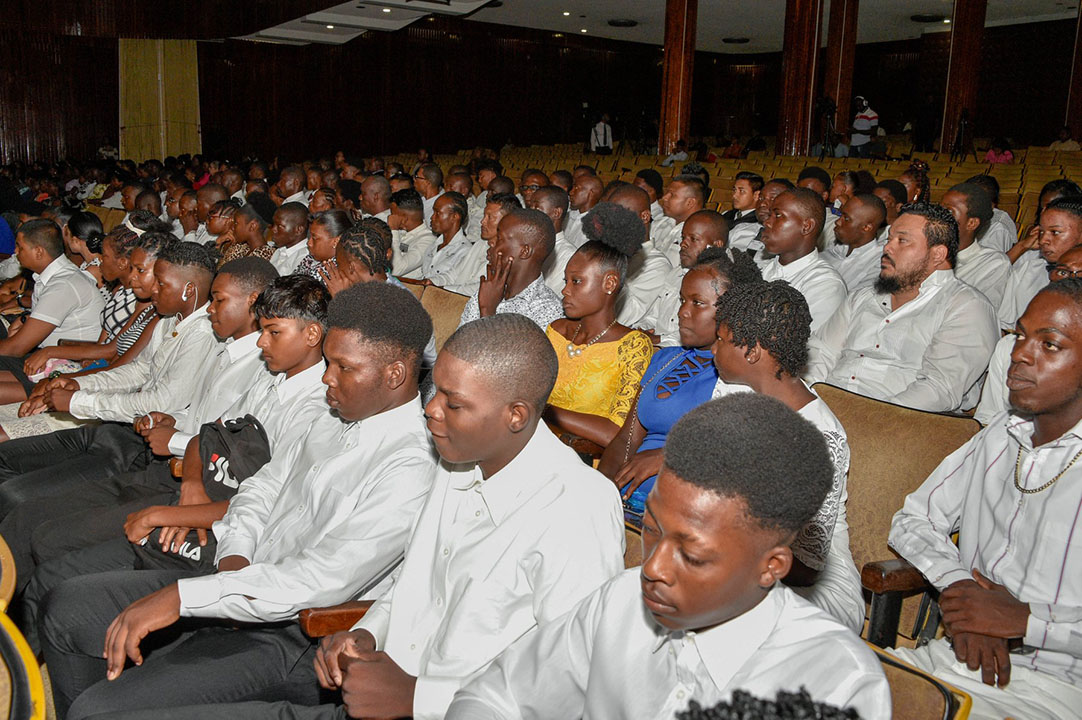The Board of Industrial Training (BIT) yesterday hosted its 14th graduation exercise for 260 youths who were part of its National Training Programme for Youth Empowerment (NTPYE) programme.
At the event, which was held at the National Cultural Centre, Deputy Permanent Secretary of the Ministry of Social Protection Shelton Daniels said that the NTPYE is BIT’s flagship programme. He highlighted that it has a competency-based, technical and vocational outlook that aims to fill the shortage of entry level technical skills personnel for the private and public sectors.
Daniels indicated that the programme is being carried out in all ten administrative regions and mainly targets vulnerable youths. He added that the 260 graduates, comprising 161 males and 99 females, would have completed the programme with the majority of trainees – 56 – having opted for the food preparation courses.

BIT Chairman Clinton Williams told the audience at the ceremony that they would have trained in excess of 500 apprentices through partnerships with several public and private sector companies. “The NTPYE programmes are being delivered in all regions of Guyana. Our programmes are designed to target vulnerable groups such as school dropouts and youths from depressed and our hinterland communities,” he said, while observing that since the beginning of the programme, it has grown significantly. Williams said that persons would have been trained in areas such as Information and Communications Technology (ICT), engineering and building trades, forestry, home economics, and more.
The BIT chairman said that with the expansion of their relationships with stakeholders in the public and private sectors, they hoped to optimise and make use of all training facilities in the country, including all five government technical institutes, the two industrial training centres, and other centres across Guyana. He added that over the years, through collaborations with the Guyana Council of Organisation for Persons with Disabilities, they would have provided vocational training for over 400 persons.
According to Williams, the BIT recently entered an agreement to train over 400 youths in skill sets relating to solar energy, boat building and outboard engine and maintenance repairs. He said that other programmes providing skills to further the green economy initiative will be implemented.
President David Granger gave the feature address at the ceremony. He told the audience about the “eventful year” that 2020 is expected to be and spoke on the improvement of the education sector with the Guyana’s expected oil wealth. The president said that next year, Guyana will be celebrating 50 years of being a republic, the production of first oil, and even elections will be held on March 2nd, 2020.
According to Granger, the commencement of the production of petroleum will result in “phenomenal economic growth” in public revenue but the aim is not just to get more money but to invest that money in the development of Guyana. “Petroleum revenues represent an opportunity for our country on this 50th anniversary to move our country forward, make Guyana more safe, more secure and make our development more sustainable,” he said. The president added that the development will not be only be for Guyanese living here but for the future generations and he emphasised that “Guyana must never be poor again.”
Granger said that Guyana must “walk on two legs,” those legs being the development of the extractive industries and the protection of the environment, which will foster the transition of Guyana becoming a green state. According to the president, the petroleum revenue will be used to move Guyana closer to becoming a low carbon economy.
“Even in anticipation of petroleum revenue, we’ve already drafted the Green State Development Strategy, the GSDS, Vision 2040. We’re not thinking about one year, we’re thinking 20 years in the future, 2040. That GSDS is our roadmap to the good life for all of you,” the president said while noting that it is a forward looking plan with a 20-year focus. He said that for the plan to be a success, it will require training of young Guyanese who will push the development of the country.
Granger said that a national industrial policy will be formulated to support the existing industries in the country. He said that the policy will rest on four pillars: Infrastructure, Investments, Innovation and Integration.
He highlighted that through infrastructure, they will be able to establish a foundation for industrialisation. “Particularly transportation infrastructure, we need more aerodromes…we need more bridges, we need more roads so that people who wish to invest in the hinterland will pay a lower cost and those who already have businesses in the hinterland will deliver their goods and services more cheaply to the markets,” he said, while adding that the infrastructure is needed especially in the new towns created over the last four years. According to Granger, in those towns, industrial estates will be developed.
While speaking on the third pillar, innovation, the president said that it can and is being fostered through ICT and the moving of Guyana to a digital state. He indicated that the digital state will deliver better public services throughout the entire country and will reduce the need to have persons travel outside of their areas of residence to access public services. “Becoming a digital state will help revolutionize the delivery of education, including distance education, by introducing technology-based teaching in the public education system and this will improve educational performance especially in the poor and remote areas of our country,” Granger said.
“The digital state, in order to succeed, requires a reservoir of highly trained persons to drive the development of the ICT sector, which requires people like you [the graduates] to get involved in digitisation in this country,” he said. The president further told the graduates and the audience that the government is committed to supporting these programmes which train youths.
The graduates were then presented with their certificates for the various courses that they would have completed.





